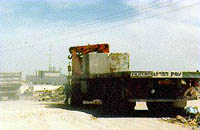
Right: Birzeit University's deserted campus, shut down by checkpoints between 5th and 18th March.
Yesterday - 5th March - after seeing the mess in Ramallah as students waited fruitlessly for the roads to reopen, I went down to the checkpoint. As I approached it, having been warned by a Palestinian police checkpoint before it that there was no way on earth I was going to get through, an Israeli soldier there started yelling at me as I walked along the road.
"Effo?!" Effo?!" ("Where?! Where?!") his screams in Hebrew carried up the valley, as I pretended I really had not idea what was going on until I had arrived at the jeep.
"Excuse me, do you speak English?" I asked, "What's going on?"
"CLOSURE! CLOSURE!" he screamed.
"Oh," I replied, "and how long will it go on for?"
"MONTHS!" he shrieked and began literally pushing me back up in the direction I had come. I'd never seen soldiers so angry. I walked back up the hill and chatted with the Palestinian police again. One policeman read my mind.
"Don't try and cross the hills," he said, "They have orders to shoot."
Of course, collective punishment is illegal under international law and Nazi hunters such as Simon Weisenthal have made a career out of establishing the legal principle that obeying an illegal order is no defence.
Plus, the soldier didn't understand, we have a university to run. A checkpoint isn't a good enough reason to stop. The next day, two friends of mine who work at the university and I took a car across the hills. The sight that greeted us is pictured at the top of this page.
Despite a thriving university community of 5,000 people, the campus was a ghost town, with just 20 people present, half of them the guards that live there. It was very sad.
Doug Struck, a journalist from the Baltimore Sun, turned up to interview us. He arrived like a desert traveller at an oasis, after managing to convince the soldiers that a press card was a good enough travel permit. It was more than odd to be talking to him in the silent buildings of the university, usually bustling with life.
We took the car back across the hill roads that evening. I figured that the soldiers would have put a checkpoint there if they were really serious about closing it.
They had done the next best thing, errecting barriers of earth and concrete blocks to stop all traffic. They had obviously been aiming at the larger saloon models though and our hatchback slipped, unscarred, between two blocks and back into Ramallah.
In this case, pragmatism won over principle. After a couple of days of nightmare situations at the checkpoints during a few short and partial liftings of the closure, I moved my computer to my house to work at home for two weeks. To work in public relations, you need a public, and believe me - more people visited the moon than Birzeit University during these two weeks.

On one trip to Jerusalem, I snapped this photo (right) in passing of a lorry with the aforementioned concrete blocks to seal off one of the smaller roads between there and Ramallah. I wrote in a previous diary entry on the use of concrete blocks to "control of the roads".
We had never seen the Israelis so intent on sealing the roads before. The Israeli government announced a six-month jail sentence and 10,000 shekel fine (about $3,300) for anyone who dared to disobey. Up to this point everyone knew that those without permits to travel to Jerusalem could pay an extra two shekels on top of the taxi fare, and could get to the city via a luffa ("curved") route if they absolutely had to.
It was a very depressing time for all. The seriousness with which the Israelis went about the closure reminded people of the intensity of the Intifada and made everyone jumpy. We were the 3 million peices of hay in Weizmann's haystack, and in the hunt for the seven or eight people that had orchestrated the four bombings, all of us were being burnt. The university academic calendar, for one thing, was up the creek.